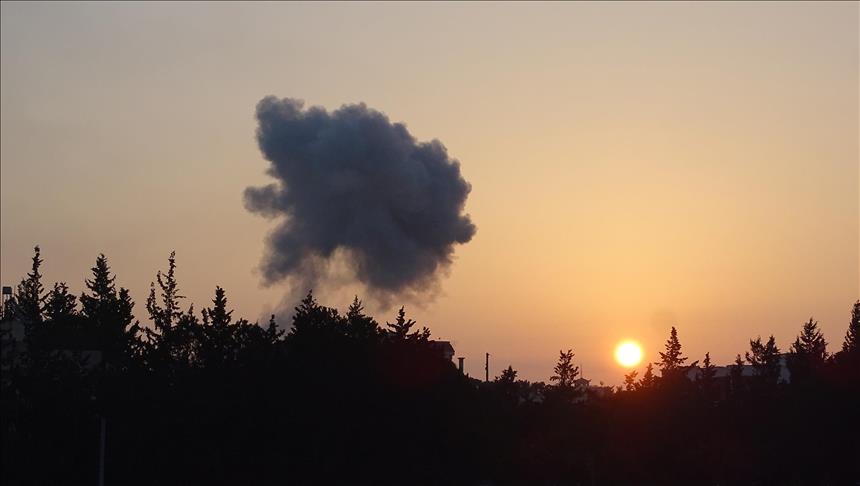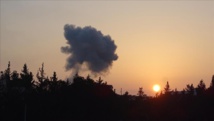Monitoring group the Syrian Observatory for Human Rights said it was quiet in the north of Latakia province and in the central provinces of Homs and Hama.
"I may be up late tonight and hope I won't be wakened tomorrow by the sound of airplanes," Mohammed Nohad, a resident of Aleppo's southern rebel-held district of Al-Kalasseh, told AFP.
The nationwide cessation of hostilities would be the first pause in fighting since Syria's civil war broke out five years ago.
UN envoy Staffan de Mistura said peace talks would resume on March 7 if the ceasefire holds and more aid is delivered -- a key sticking point in negotiations for a truce.
But previous attempts to end the fighting have failed and Russia and the US, which back opposing sides in the fight, have warned that applying it on the ground will be difficult.
"I can't hide the fact that I'm happy the war has stopped, even for a few minutes," 24-year-old regime soldier Abdel Rahman Issa said from the battlefield Jobar area on the eastern outskirts of Damascus.
"If it continues like this, maybe we can go home."
Analysts have also questioned whether it can be effective on Syria's complex battlefields, as the truce allows fighting to continue with Islamic State and Al-Nusra Front jihadists.
There were intermittent clashes after the ceasefire began between pro-regime forces and both groups, the Observatory said, as well as fighting between jihadists and Kurdish forces.
- 'Some scepticism' -
Less than an hour before the ceasefire, the UN Security Council gave its unanimous backing to the truce in a resolution drafted by the US and Russia.
US Ambassador Samantha Power acknowledged there was "some scepticism" as to whether the ceasefire will take hold, but said it offered the "best chance to reduce the violence".
A spokesman for Turkey's presidency expressed worries over the ceasefire "because of the continuing Russian air raids and ground attacks by forces of Assad".
Russia began air strikes in Syria in September saying it was targeting "terrorists", but critics have accused Moscow of hitting rebel forces in support of Assad.
Deputy Foreign Minister Gennady Gatilov said the agreement could be "a turning point" in the war, even as Russian planes launched a wave of attacks on non-jihadist rebel areas before the deadline.
The Observatory reported Russian strikes Friday on rebel bastions including the Eastern Ghouta region outside Damascus, northern Homs province and the west of Aleppo province.
The head of the Britain-based monitor, Rami Abdel Rahman, said at least 40 members of the regime forces were killed battling rebels in northern Latakia province.
Russian President Vladimir Putin insisted Moscow would continue targeting "terrorist groups".
"The decisive fight against them will, without doubt, be continued," he said in televised remarks.
"We understand fully and take into account that this will be a complicated, and maybe even contradictory process of reconciliation, but there is no other way."
- 'Put up or shut up' -
Moscow backs Assad and Washington supports the opposition, but both have made a concerted push for the ceasefire to be respected.
Speaking in Washington on Thursday, President Barack Obama put the onus firmly on the regime and Russia, saying the "world will be watching" whether they keep to the truce.
US State Department spokesman Mark Toner said Washington had received assurances from Moscow that it would not bomb the "moderate opposition" after the truce.
"I don't know how to put it any better than saying: 'It's put up or shut up time,'" he told reporters.
Iran, another key Assad ally, has said it is confident the regime will abide by the agreement.
But rebel groups on the ground have been less optimistic, and Al-Nusra's chief Mohammad al-Jolani on Friday urged Assad's opponents to intensify attacks on the regime.
"Negotiations are the ones conducted on the battlefield," he said in an audio message.
Syria's top opposition grouping, the High Negotiations Committee (HNC), said Friday that 97 opposition factions had agreed "to respect a temporary truce", but only an initial two-week period.
It said Damascus and its allies must not continue attacking rebel forces "under the pretext of fighting terrorism".
The HNC said any new bombing of the rebel-held town of Daraya, southwestern of Damascus, would violate the agreement after the army said it would exclude it from the ceasefire because forces there included Al-Nusra fighters.
Daraya was reported to be calm at midnight.
--------------------------------------------------------------------------------------------------
"I may be up late tonight and hope I won't be wakened tomorrow by the sound of airplanes," Mohammed Nohad, a resident of Aleppo's southern rebel-held district of Al-Kalasseh, told AFP.
The nationwide cessation of hostilities would be the first pause in fighting since Syria's civil war broke out five years ago.
UN envoy Staffan de Mistura said peace talks would resume on March 7 if the ceasefire holds and more aid is delivered -- a key sticking point in negotiations for a truce.
But previous attempts to end the fighting have failed and Russia and the US, which back opposing sides in the fight, have warned that applying it on the ground will be difficult.
"I can't hide the fact that I'm happy the war has stopped, even for a few minutes," 24-year-old regime soldier Abdel Rahman Issa said from the battlefield Jobar area on the eastern outskirts of Damascus.
"If it continues like this, maybe we can go home."
Analysts have also questioned whether it can be effective on Syria's complex battlefields, as the truce allows fighting to continue with Islamic State and Al-Nusra Front jihadists.
There were intermittent clashes after the ceasefire began between pro-regime forces and both groups, the Observatory said, as well as fighting between jihadists and Kurdish forces.
- 'Some scepticism' -
Less than an hour before the ceasefire, the UN Security Council gave its unanimous backing to the truce in a resolution drafted by the US and Russia.
US Ambassador Samantha Power acknowledged there was "some scepticism" as to whether the ceasefire will take hold, but said it offered the "best chance to reduce the violence".
A spokesman for Turkey's presidency expressed worries over the ceasefire "because of the continuing Russian air raids and ground attacks by forces of Assad".
Russia began air strikes in Syria in September saying it was targeting "terrorists", but critics have accused Moscow of hitting rebel forces in support of Assad.
Deputy Foreign Minister Gennady Gatilov said the agreement could be "a turning point" in the war, even as Russian planes launched a wave of attacks on non-jihadist rebel areas before the deadline.
The Observatory reported Russian strikes Friday on rebel bastions including the Eastern Ghouta region outside Damascus, northern Homs province and the west of Aleppo province.
The head of the Britain-based monitor, Rami Abdel Rahman, said at least 40 members of the regime forces were killed battling rebels in northern Latakia province.
Russian President Vladimir Putin insisted Moscow would continue targeting "terrorist groups".
"The decisive fight against them will, without doubt, be continued," he said in televised remarks.
"We understand fully and take into account that this will be a complicated, and maybe even contradictory process of reconciliation, but there is no other way."
- 'Put up or shut up' -
Moscow backs Assad and Washington supports the opposition, but both have made a concerted push for the ceasefire to be respected.
Speaking in Washington on Thursday, President Barack Obama put the onus firmly on the regime and Russia, saying the "world will be watching" whether they keep to the truce.
US State Department spokesman Mark Toner said Washington had received assurances from Moscow that it would not bomb the "moderate opposition" after the truce.
"I don't know how to put it any better than saying: 'It's put up or shut up time,'" he told reporters.
Iran, another key Assad ally, has said it is confident the regime will abide by the agreement.
But rebel groups on the ground have been less optimistic, and Al-Nusra's chief Mohammad al-Jolani on Friday urged Assad's opponents to intensify attacks on the regime.
"Negotiations are the ones conducted on the battlefield," he said in an audio message.
Syria's top opposition grouping, the High Negotiations Committee (HNC), said Friday that 97 opposition factions had agreed "to respect a temporary truce", but only an initial two-week period.
It said Damascus and its allies must not continue attacking rebel forces "under the pretext of fighting terrorism".
The HNC said any new bombing of the rebel-held town of Daraya, southwestern of Damascus, would violate the agreement after the army said it would exclude it from the ceasefire because forces there included Al-Nusra fighters.
Daraya was reported to be calm at midnight.
--------------------------------------------------------------------------------------------------









 Home
Home Politics
Politics











